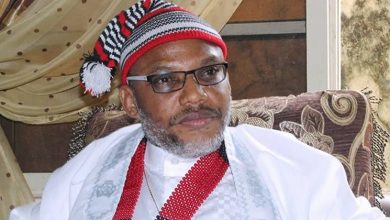
Takeaways from NSPP’s 46th Annual Conference
Adewale Kupoluyi
A timely discourse affecting society at large came to the fore in Owerri, the Capital City of Imo State as stakeholders in plant protection converged on the Federal University of Technology, Owerri (FUTO) for the 46th Annual Conference of the Nigerian Society for Plant Protection (NSPP), which was themed “Plant Health, Global Pandemic and Food Security”. The gathering was a successful hybrid of a conference that was well-attended by plant protectionists, industries, and members of agricultural-related agencies without violating the Coronavirus disease (COVID-19) protocols.
The Chief Host, Prof. Francis Eze, the Vice-Chancellor of FUTO, was represented by Prof. Polycarp Obasi, Dean of School of Agriculture and Agricultural Technology of FUTO, who declared the gathering open, while the opening ceremony was chaired by Prof. Martin Nwufo, a former Deputy Vice-Chancellor (Administration) of FUTO, as the Chairman, Conference Local Organising Committee, Dr. Frank Ojiako, officially welcomed members to the event. The keynote address entitled, “Linkages and Interconnections between Plant Health, Global Pandemic and Food Security”, was delivered by the Deputy Vice-Chancellor (Administration), Michael Okpara University of Agriculture (MOUA), Umudike, Abia State, Prof. Elechi Asawalam; the Director-General, Nigeria Agricultural Quarantine Service (NAQS), Dr. Vincent Isegbe presented a paper titled, “Securing the Place of Plants in One Health System” while another paper titled “Diagnosis and Management of Invasive and New Species of Plant Pests” was given by Prof. Ekanem Wokoma of the University of Port Harcourt (UNIPORT), Rivers State, represented by Dr. Zakka Usman of UNIPORT.

The Chairman, NSPP Board of Trustees, Prof. David Olufolaji, and other trustees were among the dignitaries present at the conference. The occasion witnessed the conferment of the society’s Fellowship on three of its members, namely: Prof. Elechi Asawalam of MOUA, Prof. Olalekan Banwo of the Ahmadu Bello University (ABU), Zaria, Kaduna State, and Prof. Emily Ayo-John of the Federal University of Agriculture, Abeokuta (FUNAAB); the 34th Volume of the Journal and maiden edition of The Compendium of Who-is-Who in Nigerian Plant Protection were launched; plenary and technical sessions that featured the presentation of papers by eminent scholars, which were extensively discussed with a total of 109 abstracts initially received. The paper and technical sessions cut across the various disciplines in plant protection. Not only that, 26 institutions, representing universities, research institutes, polytechnics, colleges of agriculture, private and government agencies/organisations took part.
A major development that gladdened the heart of participants was the fact that the Public Hearing on the Bill for an Act to Establish the Nigerian Institute for Plant Protection (NIPP) was held successfully in June 2020 and the bill is currently at the harmonisation stage. The bill is crucial because it would birth an institute that would properly coordinate issues on plant protection, advise the government on related matters, undertake a continuous assessment of biological responses to climate change within and among species in the field and at critical life-history stages of pests or overwintering stages of pathogens that are vulnerable to the abiotic and biotic impacts of climate change.
Within the prism of the apt theme, the conference carefully observed that generally, pandemics are not just health crises, but can equally result in unprecedented socio-economic challenges that can destroy lives and livelihoods; the global pandemic caused by COVID-19 has impacted negatively on the agricultural sector of the economy with a tremendous effect on plant protection; healthy plants are vital to sustainable and profitable crop production thereby ensuring the nation’s adequate supply of food, fuel and fibre; there are serious lapses and overlaps in the functions of the nation’s various agricultural production and regulation agencies; all components of food security including availability, accessibility, utilisation, and stability are paramount to the well-being of any nation; and there is a serious dearth of experts in the area of taxonomy across the plant protection discipline to tackle the issues of invasive pests.
As a way forward in meeting the many challenges facing the nation, the society has made six important recommendations in a communiqué that was issued and signed on behalf of the Communiqué Committee by its Chairman, Prof. Gabriel Ihejirika, as follows: the global vision of One Health should encompass and embrace, as equals, human health, animal health, plant health and environmental health; government and other sponsoring agencies should massively invest at all levels on knowledge-based agricultural production; the government should create, enhance and sustain harmonious and a working relationship between and among other organisations and institutions; and finally, scientists and students should be encouraged and motivated to pursue specialisation in the area of taxonomy in crop protection disciplines.

NSPP was established 51 years ago, precisely on May 16, 1970, at the then Department of Agricultural Biology, now Crop Protection and Environmental Biology, University of Ibadan, Oyo State. It is made up of professionals in plant protection and allied fields covering individuals and corporate organisations across the country. It maintains robust cooperation with other societies like the Nigerian Society of Nematologists, Weed Science Society of Nigeria, Mycological Society of Nigeria, Nigerian Phytopathology Society and Entomology Society of Nigeria. The focus of NSPP covers research, extension, storage, quarantine, and fostering a synergy between research, industry, and policy in plant protection for increased agricultural production in Nigeria, while the incumbent President is Jonathan Atungwu, a Professor of Plant Nematology at FUNAAB; the institution hosting the 47th Annual Conference of NSPP in the Rock City of Abeokuta next year.
In 2021, Owerri would always be remembered for the high quality of keynote, papers, and technical sessions that featured eminent scholars that made up of plant protectionists, industries and members of agricultural-related agencies; encouraging level of online and onsite participation by institutions from universities, research institutes, polytechnics, colleges of agriculture, private and government agencies/organisations; cheering news of the NIPP bill getting to the advanced and harmonisation stage at the National Assembly; launching of the society’s journal and maiden edition of the compendium of those that matter in the field of plant protection in Nigeria; conferment of fellowship on three active members; early announcement of the 2022 conference schedule to aid effective and efficient planning; making of observations that touch on critical aspects of our national life and more importantly, the issuance of a robust communiqué on the conference themed; “Plant Health, Global Pandemic and Food Security”.
Kupoluyi writes from Federal University of Agriculture, Abeokuta (FUNAAB), Ogun State, @AdewaleKupoluyi
FOOTNOTE: You want to share story with us? You want to advertise with us? You need publicity/live coverage for product, service, or event? Contact us on WhatsApp +2348073463653 or email [email protected]






